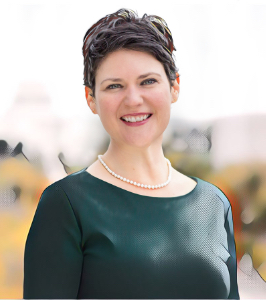A significant summer for BJC and the country
With more people explicitly embracing Christian nationalism as something to aspire to, we risk normalizing this harmful ideology at a time when it is becoming militaristic and violent.

This summer was an eventful one in the life of our country and in the life of BJC, as reflected in this extended issue of our magazine.
The Supreme Court finished its most significant — and possibly also the most controversial — term in more than 50 years. A six-justice super-majority of the Court seems to view any different treatment of religion when it comes to state benefits as per se discrimination, while abandoning long-standing doctrines that have supported “no establishment” principles to ensure a government stays neutral when it comes to religion.
The Court’s rulings depart from the American religious freedom tradition in ways that will harm the religious freedom of public school students and their families, lead to even greater discord over religion and could even threaten the system of public education itself. While the full impact of these rulings is still uncertain, our advocacy as defenders of religious freedom for all remains vital at both the Court and in our communities.
BJC returned to in-person programming this year. We had a full ballroom in Dallas for our annual luncheon, which featured Indigenous voices on faith freedom. Holly and I wrapped up season three of our award-winning podcast “Respecting Religion” in front of a live audience. After more than two years, we welcomed back interns to learn and work alongside our staff in our Capitol Hill headquarters.
We also continued to provide a witness in the public square as Christians fighting Christian nationalism. Public interest in Christian nationalism ballooned — we saw more attention on the topic this summer than in the three years BJC has been working on raising awareness and action through the Christians Against Christian Nationalism campaign. Hearings before the Select Committee to Investigate the January 6th Attack on the United States Capitol spurred some of this conversation. But most media attention came in response to extremist rhetoric from political leaders like Rep. Marjorie Taylor Greene, R-Ga., who said in July that the Republican party needs to become the party of Christian nationalism.
I’ve had the opportunity to write and be interviewed on the topic of Christian nationalism many times in the past couple of months, and one consistent message I tried to convey is that this moment is a crucial one for us to speak up. We could very well be at a turning point in this movement, but it’s not one for the better. With more people explicitly embracing Christian nationalism as something to aspire to, we risk normalizing this harmful ideology at a time when it is becoming militaristic and violent.
While the mainstreaming of Christian nationalism is absolutely a threat, we can also seize this moment as an opportunity to galvanize the majority of Americans who oppose it and want to defend religious freedom for all. I have been overwhelmed by the supportive comments I continue to receive from people who are encountering BJC’s leadership of Christians Against Christian Nationalism for the first time. They are grateful to hear their perspectives on the issue portrayed in the media — namely, that Christian nationalism is a gross distortion of the teachings of Jesus. They also see the importance of separation of church and state as something that is good for both institutions, a principle in the DNA of BJC.
Those who are most ardently pushing Christian nationalism as an organizing principle for our government and politics are blatant in their aims. Rep. Lauren Boebert, R-Colo., said this summer that “it is the church’s job to direct the state.” Andrew Torba, the founder of the online platform Gab that has hosted extremist content — and someone who has spouted anti-Semitic rhetoric himself — said this summer, “This is an explicitly Christian movement because this is an explicitly Christian country.” He also said religious minorities will have to learn to live in a “Christian society under Christian laws.”
Alarming comments like these have contributed to my view that Christian nationalism is the single biggest threat to religious freedom that our country faces today. The fact that we see this rise of Christian nationalism in the culture at the same time that the Supreme Court is eroding legal protections for religious freedom is even more concerning and makes our strong advocacy all the more necessary. Thank you for joining our fight and supporting our work at this critical time.
Amanda Tyler is executive director of BJC.
This article first appeared in the fall 2022 edition of Report from the Capital. You can download it as a PDF or read a digital flip-through edition.




